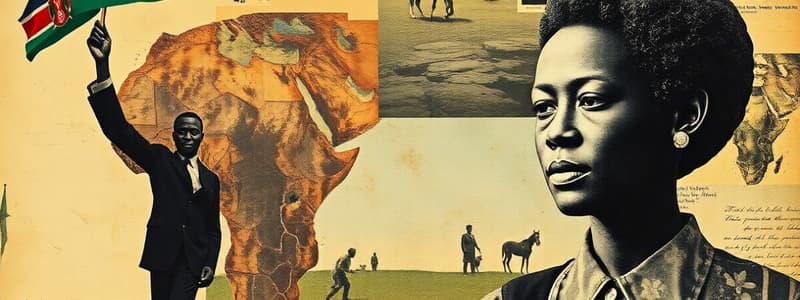Podcast
Questions and Answers
What is the central idea behind the Pan-African movement?
What is the central idea behind the Pan-African movement?
- Establishing separate nations for each African ethnic group.
- Promoting European rule and influence in Africa.
- Fostering unity and cooperation among black people for African advancement. (correct)
- Encouraging the partition of Africa into smaller, weaker states.
Which organization is a direct result of the Pan-African movement's goals?
Which organization is a direct result of the Pan-African movement's goals?
- The African Union (correct)
- The British Commonwealth
- The United Nations
- The European Union
What was the primary goal of the Mau Mau organization in Kenya?
What was the primary goal of the Mau Mau organization in Kenya?
- To secure independence and rights for Kenyans through violent means. (correct)
- To promote peaceful negotiations with the British.
- To establish a separate white-ruled state within Kenya.
- To support British colonial rule.
What significant challenge did Nigeria face shortly after gaining independence?
What significant challenge did Nigeria face shortly after gaining independence?
Who was the first president of Kenya following the 1963 democratic elections?
Who was the first president of Kenya following the 1963 democratic elections?
Flashcards
What is the Pan-African movement?
What is the Pan-African movement?
The Pan-African movement is a global movement that advocates for black unity and independence from European colonialism. It aims to strengthen African nations and fight for their freedom and progress.
Who were the Mau Mau?
Who were the Mau Mau?
A secret organization in Kenya that used violence to fight for independence from British rule between 1952 and 1960.
What is the KNAU?
What is the KNAU?
The Kenyan African National Union (KNAU) was a political party that played a key role in Kenya's independence from British rule in 1964. The KNAU is still influential in the Kenyan government, although Kenya is officially a multi-party state.
What challenges did Nigeria face after independence?
What challenges did Nigeria face after independence?
Signup and view all the flashcards
What was the role of the Pan-African movement in ending colonialism?
What was the role of the Pan-African movement in ending colonialism?
Signup and view all the flashcards
Study Notes
Pan-African Movement
- Promoted unity among Black people for African advancement.
- Sought to end colonialism and establish the African Union (AU).
- The AU advocates for African unity, peace, human rights, cooperation, and economic growth.
- Emerged in the early 1800s with Black intellectuals advocating for self-governance.
- The idea is a global African community working for independence and progress.
Kenyan Independence
- Achieved independence from British rule in 1964 under Jomo Kenyatta.
- The Kenyan African National Union (KANU) remains influential in the Kenyan government, despite Kenya's multi-party system.
- Kenya was a British colony.
- The Mau Mau (1952-1960), a secret society, used violence to fight for Kenyan rights.
- The British largely subdued the Mau Mau by 1954, but violence continued until 1960.
- Britain oversaw democratic elections in 1963, electing Kenyatta as president.
Nigerian Independence
- Gained independence from Britain in 1960.
- Experienced quick internal conflict between the Christian south and Muslim north.
- Faced military coups and violence in the early years after independence.
- Elections in 1999 presented a more democratic outlook, but Nigeria's government remained unstable.
- Britain controlled and divided Nigeria into separate colonies.
- Groups formed in Nigeria to fight British rule by the 1940s, advocating for freedom.
- Peaceful political organizations arose to support self governance by the late 1940s.
- Abubakar Tafawa Balewa became Prime Minister in 1957 after advocating for independence.
- Full independence was achieved on October 1, 1960.
Studying That Suits You
Use AI to generate personalized quizzes and flashcards to suit your learning preferences.




